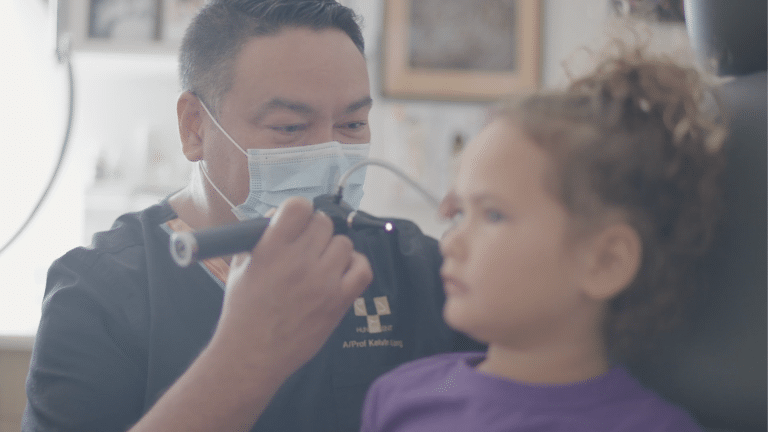
By Dr Guy Cameron
World Hearing Day is held on 3 March by the World Health Organisation (WHO). Each year it raises awareness on how to prevent deafness and hearing loss and promotes ear and hearing care across the world.

Written by Dr Guy Cameron
World Hearing Day is held on 3 March by the World Health Organisation (WHO). Each year it raises awareness on how to prevent deafness and hearing loss and promotes ear and hearing care across the world.
Hearing helps us to connect
Verbal conversation involves so much more than just speech alone.
When we share our stories, ideas, and emotions with another person, our words need to be heard and understood to have a meaningful conversation and form connections.
But how do we actually hear?
Sound waves make their way into the auditory canal and vibrate the eardrum (tympanic membrane). The bony structures of the middle ear amplify the vibrations and create ripples in the inner ear’s fluid-filled structure – the cochlear.
These ripples bend fine hair-like projections on cells that trigger an electrical signal sent into the central nervous system – a medium that our brains can recognise and understand.
Unfortunately, this complex cascade of events may not function correctly in some people and lead to partial or even complete hearing loss.
Many of us will experience some form of hearing loss in our lives
In adults, it may be an acute episode caused by temporary wax impaction that physically blocks sound transport. It can also be a function of aging or excessive and chronic exposure to loud sounds, which can impair the deeper structures of the ear.
The challenge of early diagnosis in children
One of the most challenging issues remains in early diagnosis of hearing loss in young children and early intervention.
While we don’t fully understand why these develop in the first place, children commonly develop middle ear fluid, with or without infections in their upper respiratory tract, causing blocked ears.
Infection may also occur within the middle ear, known as otitis media. Otitis media often presents with an accumulation of fluid and inflammation behind the tympanic membrane. As a result, it causes pain and hearing loss.
Not all children are affected equally
Aboriginal and Torres Strait Islander children experience far more frequent and severe ear forms of disease at a younger age than non-Indigenous Australians.
Ear diseases can impair the development of speech and literacy skills and due to unconscious biases, result in children being flagged as difficult or uncooperative.
If these hearing issues remain undiagnosed, they then go on to contribute to a sense of isolation, anxiety, and loss of cultural identity.
Our Aboriginal culture is primarily passed on verbally, in the form of stories and lore. Therefore, being unable to hear can substantially impact our connection and understanding.
It’s critical that on World Hearing Day, we must raise awareness around the impact of hearing for our First Nations children and promote Indigenous lead research.
We’re very fortunate to work in a great team supported by HMRI and the University of Newcastle to improve outcomes and make a substantial difference for our community.
We welcome new team members or interested parties to celebrate hearing through our research. Please feel free to email me at [email protected]

About Dr Guy Cameron
Guy is a proud Wailwan (Aboriginal) man living in Newcastle, NSW, Australia. He works as a research assistant with the Aboriginal Ear Health team, based at HMRI.
Guy is also employed by the Hunter New England Local Health District as a COVID-19 technical assistant and is an Indigenous tutor with the Wollotuka Institute.
He was awarded a Doctorate of Philosophy (Immunology & Microbiology) and is a medicine student enrolled in the Joint Medical Program at UoN which includes a Bachelor of Medical Science & Doctor of Medicine.
HMRI would like to acknowledge the Traditional Custodians of the land on which we work and live, the Awabakal and Worimi peoples, and pay our respects to Elders past and present. We recognise and respect their cultural heritage and beliefs and their continued connection to their land.

Hunter Medical Research Institute
We’re taking healthy further.
Locked Bag 1000
New Lambton
NSW, Australia, 2305



This site is protected by reCAPTCHA and the Google Privacy Policy and Terms of Service apply.
Copyright © 2024 Hunter Medical Research Institute | ABN: 27 081 436 919
Site by Marlin Communications
